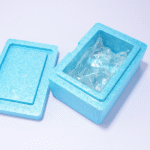If you’re managing pharmaceutical shipments, seafood exports, or medical samples, maintaining strict temperature stability is non-negotiable. Durable dry ice packs have become a game-changer for B2B cold chain logistics — providing longer cooling duration, reusable performance, and compliance with global transport standards. In this guide, you’ll learn how to choose, use, and optimize these advanced cooling systems to safeguard product integrity and reduce operational costs.
-
How durable dry ice packs improve temperature stability in pharmaceutical and perishable goods transport
-
Key materials and technologies that make these packs reusable and cost-efficient
-
How to integrate dry ice packs into your logistics strategy for better compliance and sustainability
-
Latest 2025 trends driving cold chain innovations in temperature control packaging
Why Are Durable Dry Ice Packs Essential for Modern Cold Chain Logistics?
Durable dry ice packs play a central role in maintaining ultra-low temperatures during long-distance shipping. Unlike traditional ice or gel packs, dry ice sublimates directly from solid to gas at –78.5°C, allowing for consistent cooling without water residue. When designed with reinforced polymers and advanced insulation, these packs can withstand repeated freeze–thaw cycles while maintaining performance.
Extended Performance for Critical Shipments
For pharmaceutical and biotech shipments, durability equals reliability. A single failure in thermal control can compromise vaccine potency or destroy clinical samples. Durable dry ice packs mitigate these risks by ensuring temperature uniformity for up to 96 hours, depending on configuration and insulation quality.
In seafood and perishable logistics, consistent cold performance prevents bacterial growth and preserves freshness even during customs delays or long-haul transits.
Key Advantages of Durable Dry Ice Packs
| Feature | Traditional Dry Ice | Durable Dry Ice Pack | Business Impact |
|---|---|---|---|
| Cooling Duration | 24–48 hours | 72–120 hours | Extended shipment reach |
| Reusability | Single-use | 10–50 cycles | Reduced packaging waste and cost |
| Safety | Requires gloves | Enclosed design | Safer for handlers |
| Compliance | Limited labeling | IATA, FDA compliant | Easier international transport |
Practical Use Cases
-
Pharmaceutical Distribution: Ensures temperature integrity for mRNA vaccines, biologics, and clinical trial samples.
-
Seafood Exportation: Keeps high-value fish and shellfish below freezing during long air freight.
-
Medical Transport: Maintains cryogenic temperature for organ and tissue preservation.
-
Laboratory Supply Chains: Ideal for sending temperature-sensitive reagents and biospecimens.
Case Example: A biopharma logistics company switched to durable dry ice packs and reduced spoilage claims by 35%, while cutting packaging waste by 60% across international routes.
What Materials Make a Dry Ice Pack “Durable”?
Durability in cold chain packaging is not just about toughness — it’s about thermal efficiency over multiple uses. Modern dry ice packs combine material science, insulation engineering, and safety design to achieve that balance.
High-Performance Outer Shells
Durable dry ice packs often use HDPE (High-Density Polyethylene) or EVA composite shells, which resist cracking under subzero temperatures. These materials also reduce the risk of CO₂ leakage, maintaining internal pressure balance during sublimation.
Advanced Phase Change Matrix (PCM)
While dry ice is the main cooling source, integrated phase change materials (PCM) stabilize the pack’s temperature during sublimation. This dual-layer approach ensures temperature uniformity — essential for pharmaceuticals requiring –20°C to –80°C ranges.
| Component | Function | Key Advantage | Real-World Benefit |
|---|---|---|---|
| HDPE Shell | Structural strength | Prevents deformation | Long-term reusability |
| PCM Layer | Temperature buffering | Reduces thermal spikes | Ensures product safety |
| Insulated Liner | Retains CO₂ vapor | Extends cooling duration | Lower replenishment cost |
Manufacturing Standards and Certifications
Reputable suppliers comply with:
-
IATA DGR Regulations for air transport safety
-
WHO PQS (Performance, Quality and Safety) standards for vaccine logistics
-
ISO 9001 and ISO 14001 certifications for quality and environmental management
These certifications ensure that the dry ice packs are safe, sustainable, and globally recognized for cross-border transport.
How Do Durable Dry Ice Packs Reduce Costs and Environmental Impact?
Beyond performance, durable dry ice packs offer significant cost and sustainability benefits. Reusability reduces recurring material expenses and aligns with global ESG initiatives.
Cost Efficiency Through Reuse
Traditional dry ice packaging is single-use and expensive over time. Durable alternatives, however, can be reused 10–50 times depending on handling conditions. This drastically cuts per-shipment costs.
Example:
If a company ships 10,000 pharma parcels annually and replaces single-use packs ($5 each) with reusable dry ice packs ($15 each, 20 uses), the yearly savings exceed $25,000.
Sustainability and Carbon Footprint Reduction
Dry ice is already a byproduct of industrial CO₂ capture, making it eco-friendlier than gel-based coolants. Using durable, recyclable casings further minimizes waste and supports circular logistics models.
Insight: In 2025, over 70% of global pharma logistics providers are adopting reusable packaging systems to meet carbon neutrality goals.
Eco-Friendly Logistics Integration
| Sustainable Practice | Implementation | Result |
|---|---|---|
| Reusable containers | 10–50 cycles per unit | 60% reduction in waste |
| CO₂ recovery systems | Capture from fermentation processes | Lower emissions footprint |
| Smart return logistics | Track-and-return models | Closed-loop packaging |
How to Choose the Right Durable Dry Ice Pack for Your Business Needs
Choosing the correct dry ice pack depends on your product type, temperature range, and shipping duration. Below are key considerations.
1. Temperature Range Requirements
-
Pharmaceuticals: –20°C to –80°C
-
Seafood & Meat: –18°C to –40°C
-
Medical Samples: –60°C to –78°C
Select packs designed for your specific range to prevent undercooling or excess sublimation.
2. Shipment Duration
Longer shipping routes require enhanced insulation and higher CO₂ charge. Some premium packs offer 120-hour performance for transcontinental shipments.
3. Handling and Safety
Choose packs with vented lids, ergonomic grips, and tamper-proof seals for worker safety and regulatory compliance.
4. Certification & Traceability
Ensure compliance with IATA, FDA, and WHO standards and integrate RFID or QR-based tracking for pack return and reuse monitoring.
2025 Trends in Durable Dry Ice Technology
Innovation in cold chain logistics packaging is accelerating. In 2025, new developments are transforming how B2B companies manage temperature-sensitive shipping.
Latest Advances
-
Smart Dry Ice Packs: Embedded IoT sensors monitor temperature, humidity, and CO₂ levels in real time.
-
Sublimation-Control Materials: Next-gen polymers reduce ice loss by up to 30%, improving thermal efficiency.
-
Lightweight Modular Designs: Allow customizable insulation thickness based on cargo type.
Market Insights
Global demand for durable dry ice packaging is projected to grow 18% annually through 2028, driven by pharmaceutical and e-commerce cold chain expansion. Asia-Pacific leads adoption due to its growing biologics manufacturing base and seafood export markets.
Industry Forecast: By 2027, reusable dry ice packs will account for 45% of all temperature-controlled shipments globally, up from 22% in 2022.
Common Questions About Durable Dry Ice Packs
Q1: How long do durable dry ice packs last in transit?
Depending on insulation and volume, they maintain ultra-low temperatures for 72–120 hours, ideal for long-haul or international routes.
Q2: Are they safe for air transport?
Yes. Modern designs comply with IATA DGR regulations, ensuring safe CO₂ venting and non-pressurization during flight.
Q3: Can they replace gel packs or PCM coolants?
For subzero shipments, dry ice remains superior in maintaining –78°C conditions, while PCM coolants are suitable for +2°C to +8°C transport.
Q4: What’s the best way to handle dry ice packs safely?
Use insulated gloves and ensure adequate ventilation. Reusable units minimize direct contact risk with solid CO₂.
Summary and Recommendations
To maintain integrity, safety, and compliance across pharmaceutical, seafood, and medical logistics, durable dry ice packs are the industry’s best solution in 2025. They combine long-lasting cooling, reusability, and sustainability, reducing both operational cost and environmental footprint.
Key Takeaways:
-
Durable dry ice packs provide up to 5× longer cooling duration.
-
They can be reused multiple times, slashing per-shipment cost.
-
Compliant with IATA and WHO standards, ensuring global usability.
-
Support corporate sustainability and circular packaging initiatives.
Recommended Next Steps
-
Audit your packaging supply chain to identify single-use replacements.
-
Partner with certified manufacturers of durable dry ice systems.
-
Implement return logistics programs to maximize reuse cycles.
-
Train staff in handling and monitoring best practices.
Call to Action: Start your transition toward sustainable cold chain shipping with durable dry ice packs today — ensuring every shipment arrives cold, safe, and compliant.
About Tempk
At Tempk, we specialize in advanced cold chain solutions — from durable dry ice packs to intelligent temperature monitoring systems. Our products are engineered for reliability, compliance, and sustainability, trusted by global pharmaceutical and logistics leaders.
We help companies reduce waste, lower operational costs, and achieve carbon goals without compromising performance.
Talk to our experts to explore customized dry ice pack systems tailored for your cold chain operations.























